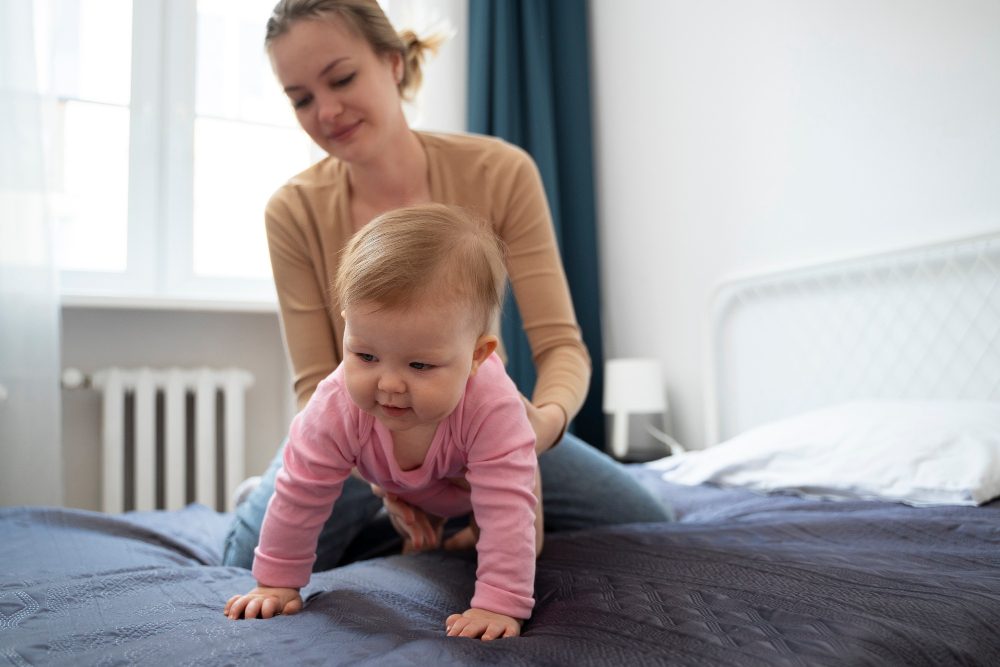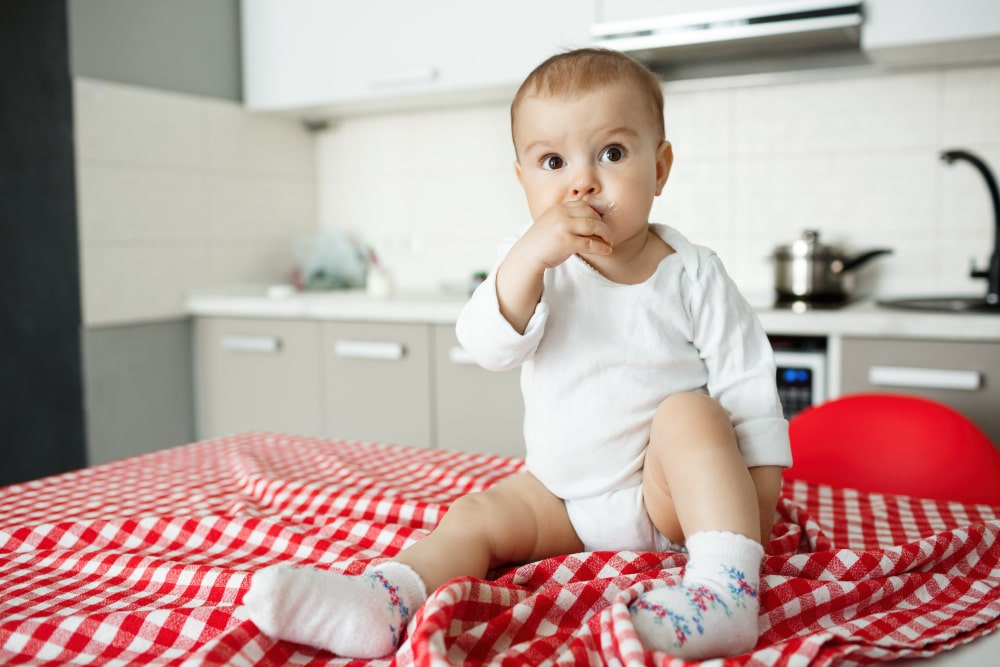
Do you have a baby who is constantly having acidic poop? Are you worried about your little one’s health and wondering how to stop acidic poop in babies? Acidic poop is a common issue in babies, and it can be caused by various factors.
When your baby’s poop is too acidic, it can lead to diaper rash, discomfort, and even infection. As a parent, it’s essential to understand the causes of acidic poop and how to prevent it.
You may also need: Is Celery Good for Teething Babies?
What is Acidic Poop?

Acidic poop is when the stool of your baby has a lower pH level than usual. A normal pH level for an infant’s stool should be between 5.5 to 7. If the pH level drops below 5.5, it’s considered acidic poop.
Causes of Acidic Poop
There are several reasons why your baby may have acidic poop. Some common causes include:
- Diet: The food you eat while breastfeeding can affect your baby’s poop, causing it to be more acidic.
- Allergies or Intolerances: Your baby could have an allergy or intolerance to something in their diet, such as cow’s milk protein. This can cause acidic poop along with other symptoms like gas and fussiness.
- Teething: The increased saliva production during teething can also make your baby’s poop more acidic.
- Medications: Certain medications, such as antibiotics, can alter the pH levels in your baby’s gut and lead to acidic poop.
- Illness: In some cases, a bacterial or viral infection can cause changes in your baby’s digestive system, leading to acidic poop.
- Food allergies or sensitivities: If your baby has a food allergy or sensitivity, it can cause irritation in their digestive tract and result in acidic poop.
- Dehydration: When babies are dehydrated, their bodies try to conserve water by absorbing more of it from the colon. This can lead to harder stools that are more acidic.
Symptoms of Acidic Poop in Babies
Parents need to recognize the signs and symptoms of acidic poop in their babies. Some common symptoms include:
- Redness and rash in the diaper area
- Soreness or pain during diaper changes
- Unusual fussiness or crying, especially when passing stool
- Watery, runny, or foul-smelling stool
- Skin peeling or blistering around the diaper area
If you notice these signs, it’s a good idea to monitor your baby’s stool and consult your pediatrician for guidance.
How to Stop Acidic Poop in Babies – Effective Solutions
If you’re searching for how to stop acidic poop in babies, there are practical steps you can take to help your little one feel better quickly.
1. Review Your Baby’s Diet
For breastfed babies, consider adjusting your own diet. Track which foods may be causing acidic reactions and try eliminating them for a week. Common culprits include dairy, caffeine, spicy foods, and citrus fruits.
For formula-fed babies, ask your pediatrician if a hypoallergenic or sensitive formula might be better.
When your baby has started solids, introduce new foods one at a time and watch for reactions.
2. Improve Diaper Care
- Change diapers promptly to reduce contact between acidic stool and your baby’s skin.
- Clean the diaper area gently with lukewarm water and a soft cloth.
- Use a barrier cream with zinc oxide to protect your baby’s skin.
- Allow for some diaper-free time each day to let the skin breathe.
3. Keep Your Baby Hydrated
Hydration helps maintain healthy digestion and can reduce stool acidity. Offer regular breastfeeds or formula feeds and monitor your baby’s urine output. If your baby is showing signs of dehydration, such as dry lips or decreased urine output, consult with your pediatrician.
4. Monitor for Allergies and Intolerances
If you suspect an allergy, such as to cow’s milk protein, consult your pediatrician. They may recommend allergy testing or dietary changes. Keep a close eye on your baby for any reactions after feeding, such as hives or vomiting. If you suspect an intolerance, such as to lactose, try eliminating that food from your diet and see if it improves your baby’s symptoms.
5. Consult Your Pediatrician About Medications
If your baby is on medication and starts having acidic poop, talk to your doctor. They may adjust the dosage or try an alternative. Some medications can cause digestive issues, so it’s important to communicate any changes in your baby’s stool to their healthcare provider.
It’s also important to follow the recommended dosage and not give your baby more medication than prescribed.
6. Soothe Diaper Rash
Use fragrance-free, gentle products on your baby’s skin. Avoid wipes with alcohol or harsh chemicals. Allow the area to fully air dry before applying a fresh diaper. Applying a diaper rash cream or ointment can also help create a protective barrier on the skin. For example, zinc oxide or petroleum-based products can provide relief and help heal the rash.
7. Keep Your Baby Clean and Dry
To prevent diaper rash, it’s important to keep your baby’s bottom clean and dry. Change their diaper frequently, especially after bowel movements. Use warm water and a mild soap to clean their bottom during diaper changes. Avoid harsh soaps or wipes with alcohol or artificial fragrances.
8. Consider Cloth Diapers
Some parents find that cloth diapers are gentler on their baby’s skin compared to disposable diapers. However, cloth diapers require more frequent changing and cleaning. Make sure to follow
9. Consider Probiotics
Research suggests that probiotics may help maintain a healthy gut balance in babies. Consult with your pediatrician before adding any supplements to your baby’s diet.
When to See a Doctor
If your baby’s acidic poop is persistent, accompanied by a high fever, blood in stool, severe diaper rash, or poor weight gain, contact your pediatrician promptly. This could suggest an underlying condition that requires medical attention and evaluation. Your pediatrician may recommend dietary changes, medication, or further testing to determine the cause of your baby’s acidic poop.
Final Words
Knowing how to stop acidic poop in babies empowers you to protect your baby’s comfort and health. By identifying the cause and taking quick action, you can help soothe your baby and prevent further discomfort. Always consult your pediatrician before making significant dietary or medication changes.
Be patient and persistent in finding the right solution for your baby. With proper care and attention, you can help your baby overcome acidic poop and thrive in good health.
Frequently Asked Questions
Is it normal for newborns to have acidic poop?
It is common for newborns to have slightly acidic stool due to their immature digestive system. However, persistent acidity may indicate an underlying issue that requires further investigation and treatment. Always consult with your pediatrician if you are concerned about your baby’s stool.
How often should I check my baby’s diaper for signs of acidic poop?
It is recommended to check your baby’s diaper every few hours, or whenever you suspect they may have soiled their diaper. If you notice any signs of acidic poop, such as redness or irritation on their skin, it is important to change their diaper immediately and clean the affected area thoroughly.
Can breastfeeding affect my baby’s stool acidity?
Yes, a breastfeeding mother’s diet can influence her baby’s digestion. Foods like dairy, caffeine, or acidic items in the mother’s diet may contribute to stool acidity. Adjusting the diet may help, but consult your pediatrician first.
Can I treat acidic poop at home or do I need to see a doctor?
Mild cases of acidic poop can often be treated at home by adjusting diet and ensuring proper hydration. However, if the symptoms persist or become severe, it is important to consult a pediatrician for proper diagnosis and treatment.
Read More: How to Make Bone Marrow for Baby
